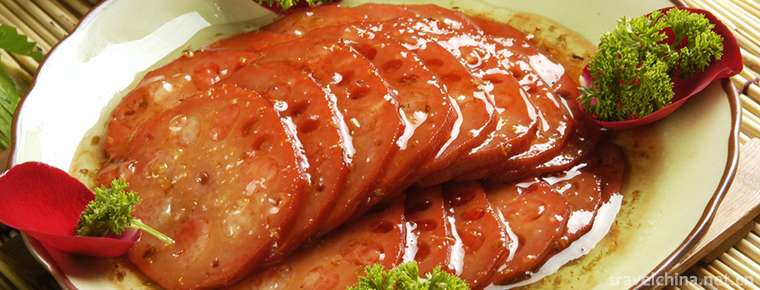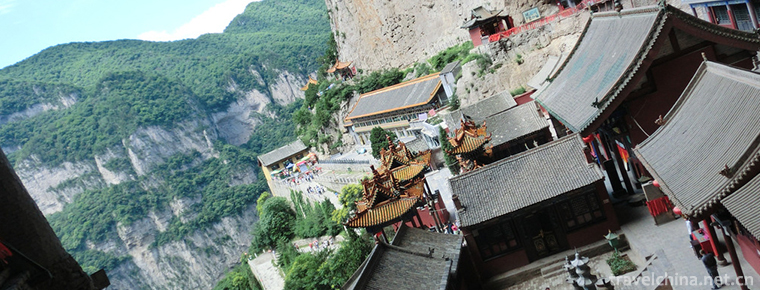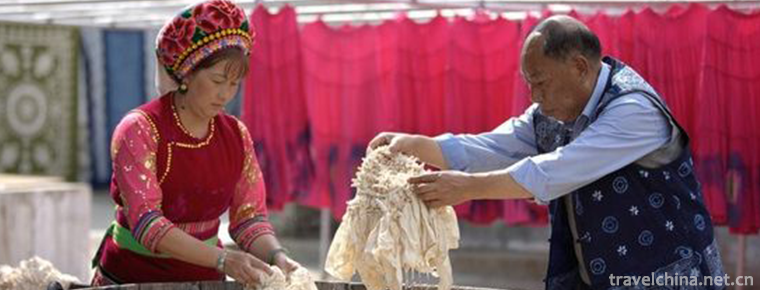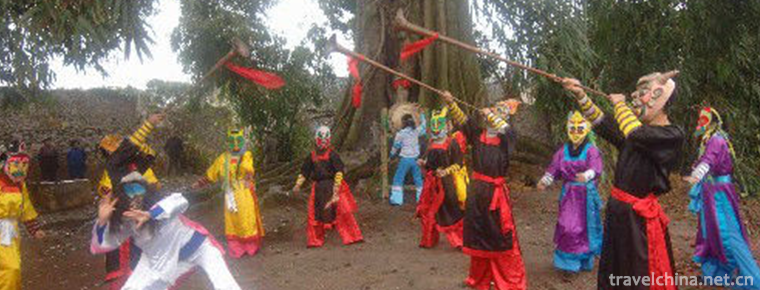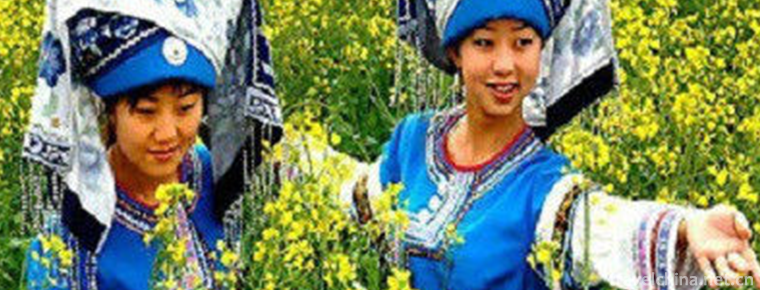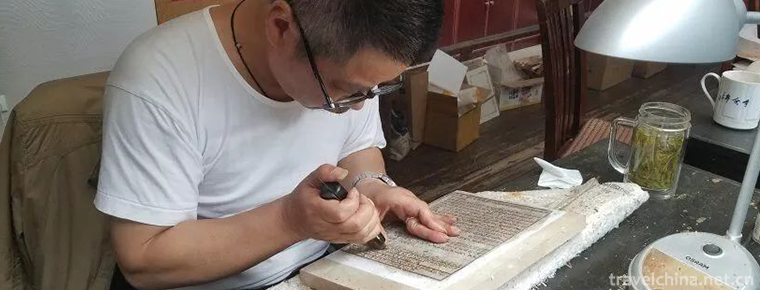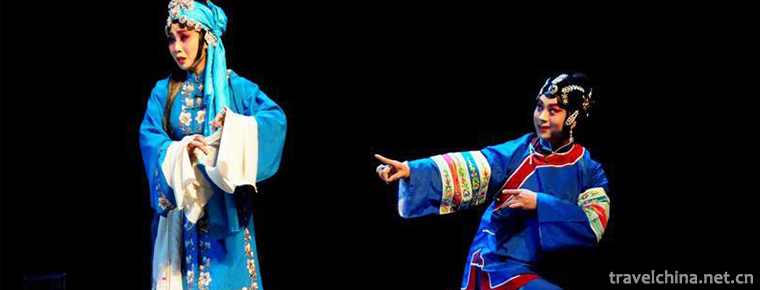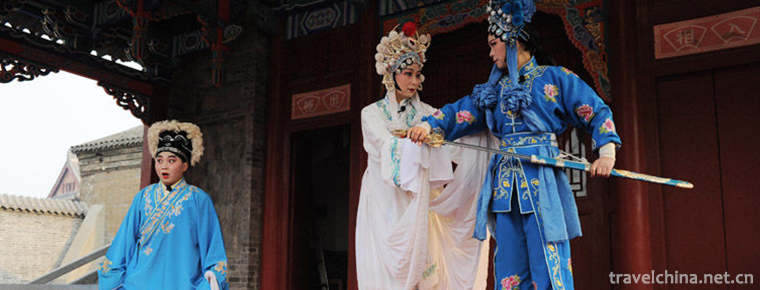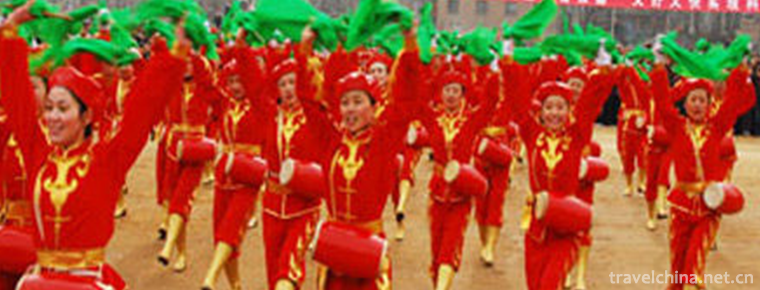Yao Peoples Playing Hall
Yao Peoples Playing Hall
The Playing Hall is a folk grand gathering of memorizing ancestors, recalling history, celebrating harvest, rewarding vows, disseminating knowledge and mass entertainment activities in Liannan Paiyao. The Grand Hall lasts three days, once every three or five years, and the Little Hall lasts one day, once every two or three years, on the day of the 16th Pangu Grandmother's birthday on the lunar calendar. During the Cultural Revolution, the Opera Hall was imprisoned. It was not until the late 1980s that the Opera Hall was initially restored.
On May 20, 2006, the Yao People's Playing Hall declared by Qingyuan City of Guangdong Province was listed in the first batch of national intangible cultural heritage list with the approval of the State Council.
Festival History
Liannan Yao Autonomous County, Qingyuan City, located in the northwest of the mountainous area of northern Guangdong Province, is the only inhabited area of Paiyao people in China, and also the area where opera halls are spread. As a large-scale cultural activity of the Yao nationality, the Playing Hall is mainly popular in Paiyao villages in six townships, including three rows (including Nangang), Vortex Water, Daping, Xiangping (including Panshi), Sanjiang (containing Jinkeng), etc. Its specific manifestations include ancestor worship, singing hall, Guozhou dance, long drum dance, Yao singing and singing, Fazhen performance, and pursuing black side. People, etc. According to historical records, during the Hongwu period of Ming Dynasty (1368-1398), Paiyao had a complete Opera Hall in its heyday, and it has a history of more than 600 years.
"Playing the Song Hall" is the most grand and largest traditional festival for the eight rows of Yao people to celebrate a bumper harvest. According to Guangdong Xinyu, "On the sixteenth day of mid-winter, Biye Gai Tianye, Zhuyao to the temple for the meeting, known as the play hall, men and women gather to dance and sing. At the same time, free marriage, simple etiquette. Thus, the Yao people's "play hall" scheduled to be held on October 16 of the lunar calendar is a traditional festival to spread historical knowledge and celebrate a year of hard work and harvest.
Festival activities
Form of activity
The Opera Hall is divided into big and small halls. The hall lasts three days and nine days and is held every ten years. The small auditorium lasts for one day, three years and five years. The holding of large or small canteens is decided by the people of all platoons, but the time is set on October 16 of the lunar calendar. This day is also the traditional festival of the Yao nationality in the whole country, "Panwang Festival" and even the southern eight rows are called "play hall". Before June and July, families began to accumulate grain, soybeans, fatten pigs, cattle, chickens, ducks and so on. The elders such as Tianchang Gong and Chief Gong must meet in advance and agree on the expenditure of the auditorium, then allocate donations to repair Paili temple, paint and renovate the statue of Panguwang and the ancestor statue of each house's surname, and buy wine, meat, incense candles and other auditorium supplies.
Each family informs relatives and friends beforehand and invites them to play in the upper row at that time. At the same time, slaughter cattle, kill chickens and ducks, grind tofu, make glutinous rice cakes, brew rice wine, entertain guests from all directions. Nowadays, with the development of production and the improvement of life, Yao people's "play hall" is also bringing forth new ideas and new contents. On the day of the opera hall, Yao families got up early, sounded three earthquakes in the morning, then gongs tinkled, horns muttered, long drums and bangs, ushered in the traditional festival.
A grand ceremony of wandering gods
The first ceremony of the opera hall, the grand ceremony of "Goddess of Wandering". Three earthen guns opened the road, and then an old Yao man, the most authoritative person in the village, led the parade through the streets and alleys with gongs. The old man was followed by two big men with three knives on both sides, holding a bamboo with branches and leaves in both hands. (The mouth of the bowl is big, how long is three feet long, so-called "Biao bamboo".) Corn buns, rice ears, flower strips and colored silk ribbons hang from bamboo branches. After the bamboo, there was a team of gods, followed by long drums, gongs, suona, men's song, women's song, children's team and hunting teams with spears, knives, forks and bird guns. They roamed the streets and lanes in a vast and noisy drum music, singing and dancing. The procession passes through alleys and corners where people distribute bamboo cakes and fruits and reward them with wine. The marchers hung Yao bags to collect the goods. The wine was a bowl for each person, and they drank it up. At this moment, Yao Pai Mountain Village is full of people dancing and costumes. The singing and dancing team is full of vigorous and rugged inspiration. It is very spectacular. When the sound of drums and horns of Dang, Wu, Du, Buzz and Table Tennis resounded through the mountains one after another, Yao Zhai was full of joy, and people were immersed in the joy and warmth of dancing.
Singing and dancing
At the end of the journey, everyone shares the delicacies of wine and food. After drinking heavily, people came to the "song hall flat" to "eulogize and dance". At this time, the girls of Yao Pai, dressed in costumes, with silver rings around their necks and beads of wild Coix at their heads, came limping up and arranged on the top of Geping. First, the master of ceremonies went into the middle of the auditorium, singing aloud, and all the people sang in unison, which shocked the mountains. Subsequently, young Yao men in groups of 35, head wrapped in red cloth headscarf, high insert white pheasant feathers, dressed in costumes, waist hanging long drums, whistle, to the girls jump rough, vigorous long drum inspiration, while dancing and singing. Generally, it starts with the urge to sing, then the interrogation song, and then the first song and the deep song. Girls and them answer each other questions and answers to songs, vivid images, humorous jokes, vivid and profound epigrams, which are intertwined with interesting. Unmarried men and women pour out their hearts and take this opportunity to choose a spouse, very lively.
Crossing prefectures and prefectures
Crossing the state and the government is a central link in the opera hall. The purpose is to remember the arduous journey of our ancestors'migration to Yaoshan. They put 36 bamboo sticks on the floor of the auditorium, and put on coloured paper signs such as Yongzhou, Daozhou and Jingzhou. Bamboo sticks are inserted into branches every two meters in a square shape. At that time, the chiefs and gentlemen will ring the brass bell and read the classics to open the way. Then the long drums, horns, gongs, men's and women's singing teams will grow up around them. The bamboo sticks (state capitals) move around, and each state capitals revolve around for nine weeks. It's like a spectacular battle march in ancient times.
Pursue the Three Strangers
There are endless songs in Yao's family. When people sing enough, jump tired and get drunk, the singing hall enters the ritual of pursuing the "three monsters". The so-called "three strange" means that the three men dress up as black, yellow and white faces in three colors. Represents the devil's evil, hanging three kilograms of pork in front of the run, followed by the crowd. Some hold up their knives and axes, others hold their hoes and sticks and shout "Kill! Catch up! Beat! "Take the pork from them. Despite bumpy roads, the "three monsters" rushed out of dense crowds and fled to the fields and hills. The ritual of "pursuing and fighting three strange people" did not stop until the Runaways were exhausted. Later, the three kilograms of pork belonged to the actor.
Shooting Fazhen
"Shooting Fazhen" is the most spectacular people's ceremony in the opera hall. Legend has it that Fazhenyuan is a national hero who has made great contributions to expelling foreign aggression and protecting the Yao family. Later, however, they turned traitors and acted as adulterers, introducing foreign enemies into Yaoshan, bringing disaster to the Yao people, who wanted to shoot him. Another kind of legend is really a national hero. The Yao family always commemorates him when playing in the auditorium. The ceremony was featured by a handsome and powerful young man dressed up as Fazhen, holding a cock in his left hand and a sword in his right hand, standing upright on the wooden ladder on the cross-frame, then several people lifted the wooden ladder and marched on the auditorium floor. Then several gunmen followed him and fired bird guns into the sky. From the point of view of the form of performance, the content of reflection belongs to the latter, i.e. eulogizing the truth of the law to commemorate it.
Pay God for His Wish
One of the most important rituals in the Opera Hall is to send gods, that is, to return ancestral statues to temples. When the sunset set sets, the various ceremonies attended by the group are over, and people go home for dinner. During the dinner, the guests and hosts had a good drink. Some Yao people sing while drinking in front of their six relatives, mostly telling historical or mythological stories. In the past, the tune of Yao songs was depressed and depressed. Even the love songs sung at the time of marriage still had a feeling of grief, which shows the depth of oppression suffered by the Yao people for thousands of years.
Current situation of inheritance
After liberation, the leading departments of the local party, government, culture and dynasty attached great importance to Paiyao, a traditional festival. The people's government of Liannan Yao Autonomous County once led and organized several grand festivals of "playing hall" held in Yao Volleyball, such as Dazhao, Yaoling, Junliao, etc., and invited guests from provincial people's committees committee, Literary Federation and Writers'Association in advance. Poets, artists, musicians, photographers, newspapers and television reporters attend the celebrations. Nowadays, on the grand festival of "Playing the Song Hall", Yao compatriots open their voices and sing to the wise leadership of the Communist Party, praising the Yao family's new life with high-spirited, lyric and lively songs.
Inheritance Significance
Paiyao has no written language of its own ethnic group, so playing the auditorium has become an important carrier of cultural exchange and heritage of history. The Yao Sutra recited in the Opera Hall provides strong evidence for the ethnic origin of Paiyao, and provides sufficient materials for the time of Yao's classification and the study of folk beliefs and creation of the Yao Sutra of Paiyao. In addition, the Yao Jing also reflects the ancient Lingnan war, which has high historical research value in ethnology, sociology and folklore. In addition, the exquisite headwear, accessories, gorgeous costumes, unique long drum, master dance, and the horns, gongs, suona, mango flute, May xiao, flute and other national folk instruments used in the Opera Hall have a strong national artistic style and high artistic value.

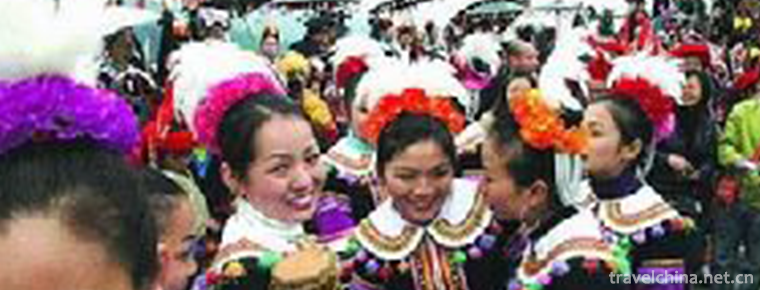
-
Steamed Lotus Root Stuffed with Glutinous Rice
Osmanthus sweet-scented glutinous rice lotus root, also known as honey juice glutinous rice lotus root, is one of the characteristics of the traditional famous spots in the south of the Yangtze River..
Views: 178 Time 2018-10-27 -
Mianshan Scenic Area
Mianshan Scenic Spot is a national AAAAA class tourist attraction, a key scenic spot in Shanxi Province, the birthplace of Ching Ming Festival (Cold Food Festival),.
Views: 298 Time 2018-11-24 -
Eight Zhai ditch
Bazhaigou, located in Dongli Village, Guitai Town, the hinterland of 100,000 mountains, more than 50 kilometers northwest of Qinbei District, Qinzhou, Guangxi Zhuang Autonomous Region.
Views: 99 Time 2018-12-24 -
Bai nationality tiedyeing skills
Bai tie-dyeing technology, the local traditional textile dyeing technology in Dali City, Yunnan Province, is one of the national intangible cultural heritage..
Views: 210 Time 2019-04-03 -
March 3 of Buyi Nationality
Buyi "March 3" is a traditional festival held by Buyi people on the third day of March in the lunar calendar. It mainly takes the form of offering sacrifices to the gods of the society and s.
Views: 128 Time 2019-04-04 -
Bouyei Pange
Bouyei Pange is a traditional folk song of the Bouyei nationality. It is a folk literary work created and sung in the original Bouyei language. Bouyei Pange is popular in Buyi villages.
Views: 117 Time 2019-04-04 -
Engraving Printing Skills
Engraving printing technology, Yangzhou City, Jiangsu Province, local traditional handicraft, one of the national intangible cultural heritage..
Views: 393 Time 2019-04-27 -
Shangdang Erhuang
Pihuangqiang in Shangdang area is called Shangdang Erhuang. It is an independent opera with a history of more than 200 years. Locals call it "Tu Erhuang". At present, Shangdang Erhuang is on.
Views: 177 Time 2019-06-13 -
Violin Opera
Violin opera, originally a flower-drum opera in Yueyang, Hunan Province, spread to Chongyang, Tongcheng and other places around the end of the Qing Dynasty and renamed "Violin Opera", is a u.
Views: 167 Time 2019-06-19 -
Yicheng Flower Drum
Yicheng Huagu, according to historical records, existed during the Zhenguan period of the Tang Dynasty, reached its peak in the Ming Dynasty, and only in the Qing Dynasty did this activity have a clea.
Views: 192 Time 2019-07-13 -
Resources and environment of Leshan
By the end of 2018, the total energy consumption of Leshan City was 15.3994 million tons of standard coal, an increase of 580900 tons of standard coal over the previous year. The energy consumption of 10000 yuan GDP decreased by 4.38%..
Views: 144 Time 2020-12-17 -
Nanchong first industry
In 2019, the sown area of grain crops in Nanchong is 558000 ha, which is 0.15% lower than that in 2018. The sown area of oil crops is 152000 ha, an increase of 1.9% over that in 2018. The vegetable planting area is 154000 hectares, an increase of 3.9% over that in 2018..
Views: 361 Time 2020-12-17
